Entrepreneurship: Ventures, Economic Impact, Traits, and Influences
VerifiedAdded on 2024/05/30
|27
|5664
|387
Report
AI Summary
This report provides a comprehensive analysis of entrepreneurship, examining various types of entrepreneurial ventures, including scalable startups, social enterprises, and small-scale businesses, and their relationship to different typologies like lifestyle, small profit, and high growth ventures. It explores the similarities and differences between private, public, and social enterprises, as well as micro, small, and medium-sized ventures, considering their roles, characteristics, and objectives. The report presents and assesses data illustrating the impact of micro and small businesses on the economy at local, regional, national, and international levels, explaining their importance in the growth of the social economy. Furthermore, it determines the characteristics of successful entrepreneurs, examines how personal backgrounds and experiences influence entrepreneurship, and assesses the relationship between entrepreneurial personality, motivation, and mindset. The study delves into how small businesses impact economies at different levels, supported by examples and analysis.

Understanding Entrepreneurship
1
1
Paraphrase This Document
Need a fresh take? Get an instant paraphrase of this document with our AI Paraphraser
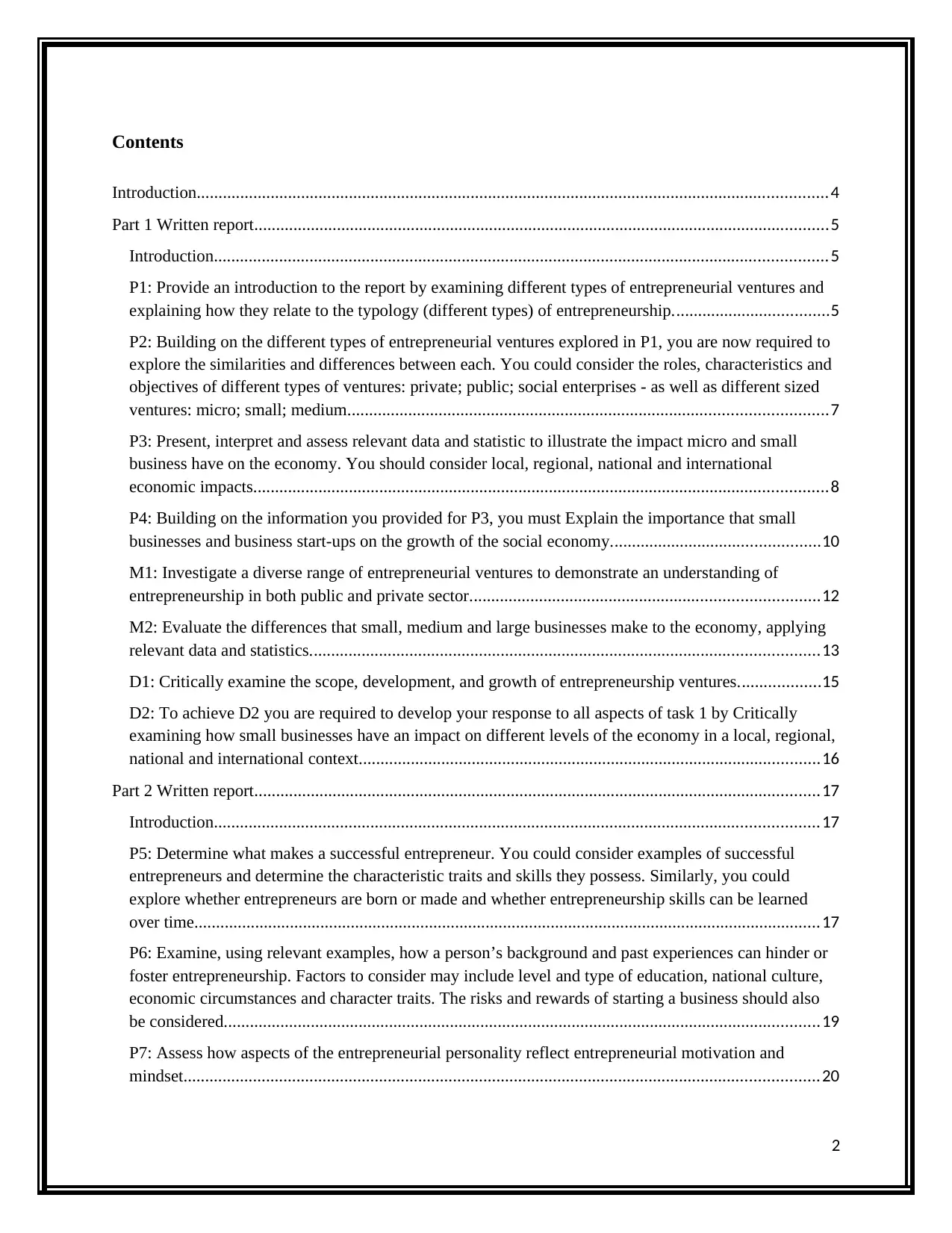
Contents
Introduction.................................................................................................................................................4
Part 1 Written report....................................................................................................................................5
Introduction.............................................................................................................................................5
P1: Provide an introduction to the report by examining different types of entrepreneurial ventures and
explaining how they relate to the typology (different types) of entrepreneurship....................................5
P2: Building on the different types of entrepreneurial ventures explored in P1, you are now required to
explore the similarities and differences between each. You could consider the roles, characteristics and
objectives of different types of ventures: private; public; social enterprises - as well as different sized
ventures: micro; small; medium..............................................................................................................7
P3: Present, interpret and assess relevant data and statistic to illustrate the impact micro and small
business have on the economy. You should consider local, regional, national and international
economic impacts....................................................................................................................................8
P4: Building on the information you provided for P3, you must Explain the importance that small
businesses and business start-ups on the growth of the social economy................................................10
M1: Investigate a diverse range of entrepreneurial ventures to demonstrate an understanding of
entrepreneurship in both public and private sector................................................................................12
M2: Evaluate the differences that small, medium and large businesses make to the economy, applying
relevant data and statistics.....................................................................................................................13
D1: Critically examine the scope, development, and growth of entrepreneurship ventures...................15
D2: To achieve D2 you are required to develop your response to all aspects of task 1 by Critically
examining how small businesses have an impact on different levels of the economy in a local, regional,
national and international context..........................................................................................................16
Part 2 Written report..................................................................................................................................17
Introduction...........................................................................................................................................17
P5: Determine what makes a successful entrepreneur. You could consider examples of successful
entrepreneurs and determine the characteristic traits and skills they possess. Similarly, you could
explore whether entrepreneurs are born or made and whether entrepreneurship skills can be learned
over time................................................................................................................................................17
P6: Examine, using relevant examples, how a person’s background and past experiences can hinder or
foster entrepreneurship. Factors to consider may include level and type of education, national culture,
economic circumstances and character traits. The risks and rewards of starting a business should also
be considered.........................................................................................................................................19
P7: Assess how aspects of the entrepreneurial personality reflect entrepreneurial motivation and
mindset..................................................................................................................................................20
2
Introduction.................................................................................................................................................4
Part 1 Written report....................................................................................................................................5
Introduction.............................................................................................................................................5
P1: Provide an introduction to the report by examining different types of entrepreneurial ventures and
explaining how they relate to the typology (different types) of entrepreneurship....................................5
P2: Building on the different types of entrepreneurial ventures explored in P1, you are now required to
explore the similarities and differences between each. You could consider the roles, characteristics and
objectives of different types of ventures: private; public; social enterprises - as well as different sized
ventures: micro; small; medium..............................................................................................................7
P3: Present, interpret and assess relevant data and statistic to illustrate the impact micro and small
business have on the economy. You should consider local, regional, national and international
economic impacts....................................................................................................................................8
P4: Building on the information you provided for P3, you must Explain the importance that small
businesses and business start-ups on the growth of the social economy................................................10
M1: Investigate a diverse range of entrepreneurial ventures to demonstrate an understanding of
entrepreneurship in both public and private sector................................................................................12
M2: Evaluate the differences that small, medium and large businesses make to the economy, applying
relevant data and statistics.....................................................................................................................13
D1: Critically examine the scope, development, and growth of entrepreneurship ventures...................15
D2: To achieve D2 you are required to develop your response to all aspects of task 1 by Critically
examining how small businesses have an impact on different levels of the economy in a local, regional,
national and international context..........................................................................................................16
Part 2 Written report..................................................................................................................................17
Introduction...........................................................................................................................................17
P5: Determine what makes a successful entrepreneur. You could consider examples of successful
entrepreneurs and determine the characteristic traits and skills they possess. Similarly, you could
explore whether entrepreneurs are born or made and whether entrepreneurship skills can be learned
over time................................................................................................................................................17
P6: Examine, using relevant examples, how a person’s background and past experiences can hinder or
foster entrepreneurship. Factors to consider may include level and type of education, national culture,
economic circumstances and character traits. The risks and rewards of starting a business should also
be considered.........................................................................................................................................19
P7: Assess how aspects of the entrepreneurial personality reflect entrepreneurial motivation and
mindset..................................................................................................................................................20
2
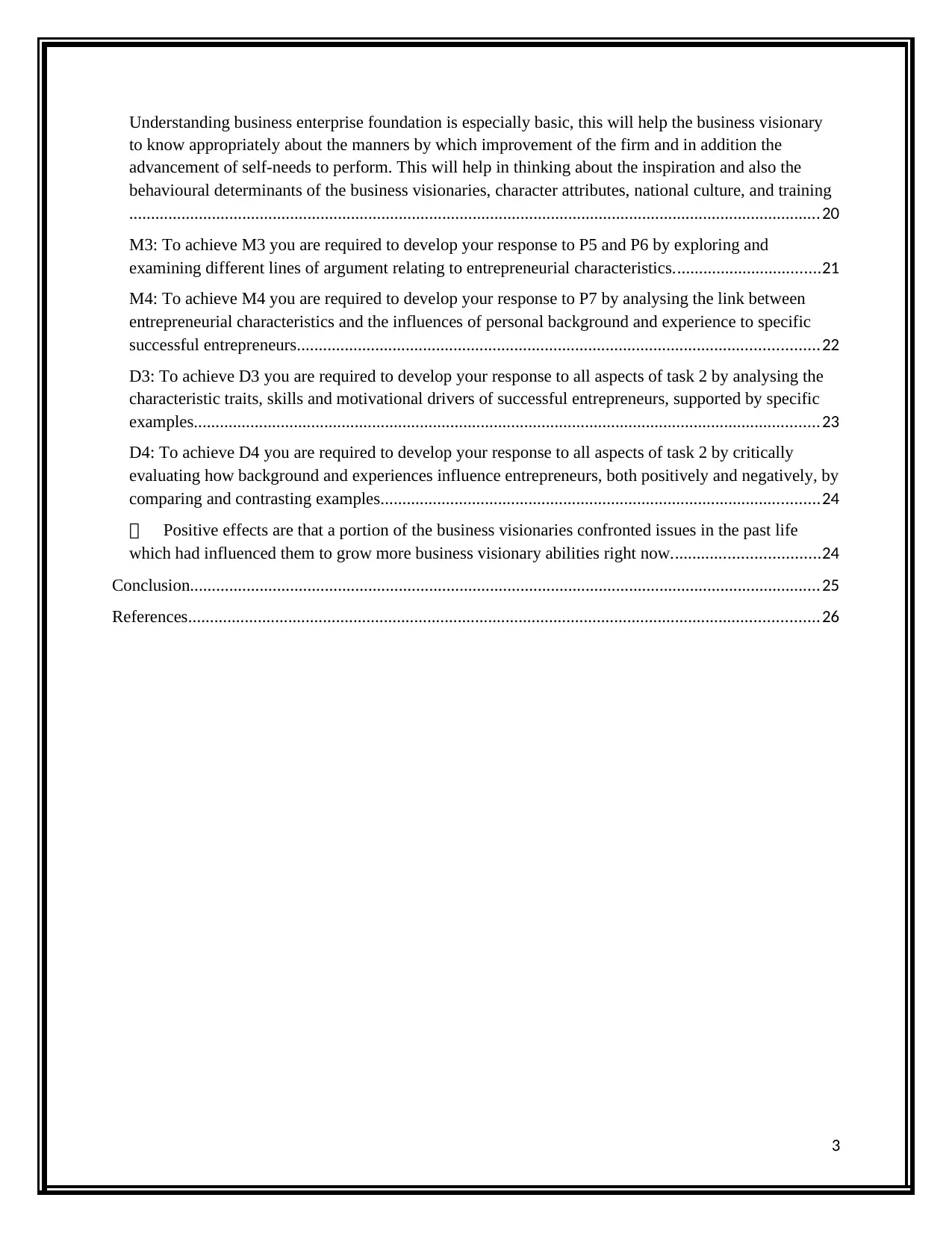
Understanding business enterprise foundation is especially basic, this will help the business visionary
to know appropriately about the manners by which improvement of the firm and in addition the
advancement of self-needs to perform. This will help in thinking about the inspiration and also the
behavioural determinants of the business visionaries, character attributes, national culture, and training
...............................................................................................................................................................20
M3: To achieve M3 you are required to develop your response to P5 and P6 by exploring and
examining different lines of argument relating to entrepreneurial characteristics..................................21
M4: To achieve M4 you are required to develop your response to P7 by analysing the link between
entrepreneurial characteristics and the influences of personal background and experience to specific
successful entrepreneurs........................................................................................................................22
D3: To achieve D3 you are required to develop your response to all aspects of task 2 by analysing the
characteristic traits, skills and motivational drivers of successful entrepreneurs, supported by specific
examples................................................................................................................................................23
D4: To achieve D4 you are required to develop your response to all aspects of task 2 by critically
evaluating how background and experiences influence entrepreneurs, both positively and negatively, by
comparing and contrasting examples.....................................................................................................24
Positive effects are that a portion of the business visionaries confronted issues in the past life
which had influenced them to grow more business visionary abilities right now..................................24
Conclusion.................................................................................................................................................25
References.................................................................................................................................................26
3
to know appropriately about the manners by which improvement of the firm and in addition the
advancement of self-needs to perform. This will help in thinking about the inspiration and also the
behavioural determinants of the business visionaries, character attributes, national culture, and training
...............................................................................................................................................................20
M3: To achieve M3 you are required to develop your response to P5 and P6 by exploring and
examining different lines of argument relating to entrepreneurial characteristics..................................21
M4: To achieve M4 you are required to develop your response to P7 by analysing the link between
entrepreneurial characteristics and the influences of personal background and experience to specific
successful entrepreneurs........................................................................................................................22
D3: To achieve D3 you are required to develop your response to all aspects of task 2 by analysing the
characteristic traits, skills and motivational drivers of successful entrepreneurs, supported by specific
examples................................................................................................................................................23
D4: To achieve D4 you are required to develop your response to all aspects of task 2 by critically
evaluating how background and experiences influence entrepreneurs, both positively and negatively, by
comparing and contrasting examples.....................................................................................................24
Positive effects are that a portion of the business visionaries confronted issues in the past life
which had influenced them to grow more business visionary abilities right now..................................24
Conclusion.................................................................................................................................................25
References.................................................................................................................................................26
3
⊘ This is a preview!⊘
Do you want full access?
Subscribe today to unlock all pages.

Trusted by 1+ million students worldwide
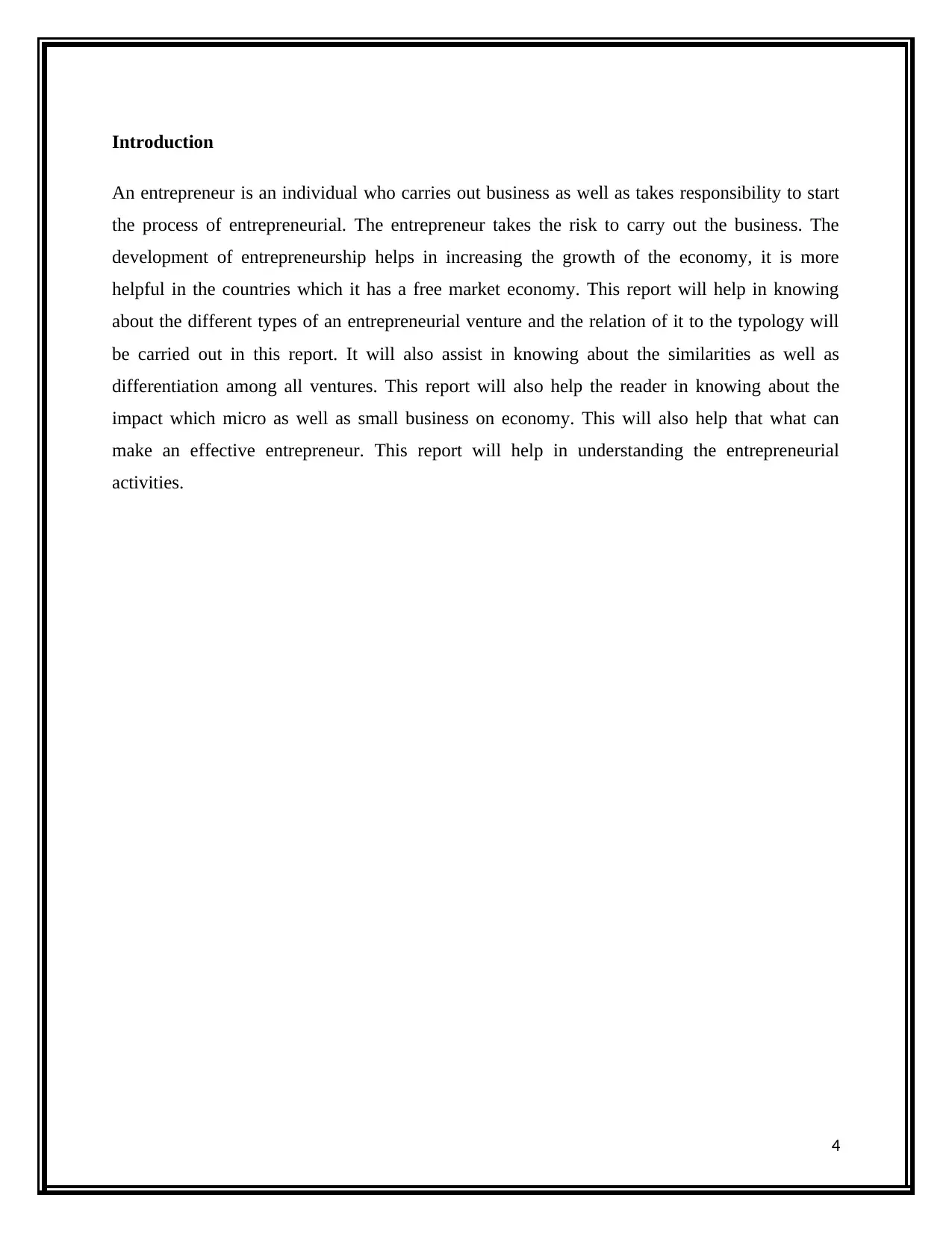
Introduction
An entrepreneur is an individual who carries out business as well as takes responsibility to start
the process of entrepreneurial. The entrepreneur takes the risk to carry out the business. The
development of entrepreneurship helps in increasing the growth of the economy, it is more
helpful in the countries which it has a free market economy. This report will help in knowing
about the different types of an entrepreneurial venture and the relation of it to the typology will
be carried out in this report. It will also assist in knowing about the similarities as well as
differentiation among all ventures. This report will also help the reader in knowing about the
impact which micro as well as small business on economy. This will also help that what can
make an effective entrepreneur. This report will help in understanding the entrepreneurial
activities.
4
An entrepreneur is an individual who carries out business as well as takes responsibility to start
the process of entrepreneurial. The entrepreneur takes the risk to carry out the business. The
development of entrepreneurship helps in increasing the growth of the economy, it is more
helpful in the countries which it has a free market economy. This report will help in knowing
about the different types of an entrepreneurial venture and the relation of it to the typology will
be carried out in this report. It will also assist in knowing about the similarities as well as
differentiation among all ventures. This report will also help the reader in knowing about the
impact which micro as well as small business on economy. This will also help that what can
make an effective entrepreneur. This report will help in understanding the entrepreneurial
activities.
4
Paraphrase This Document
Need a fresh take? Get an instant paraphrase of this document with our AI Paraphraser
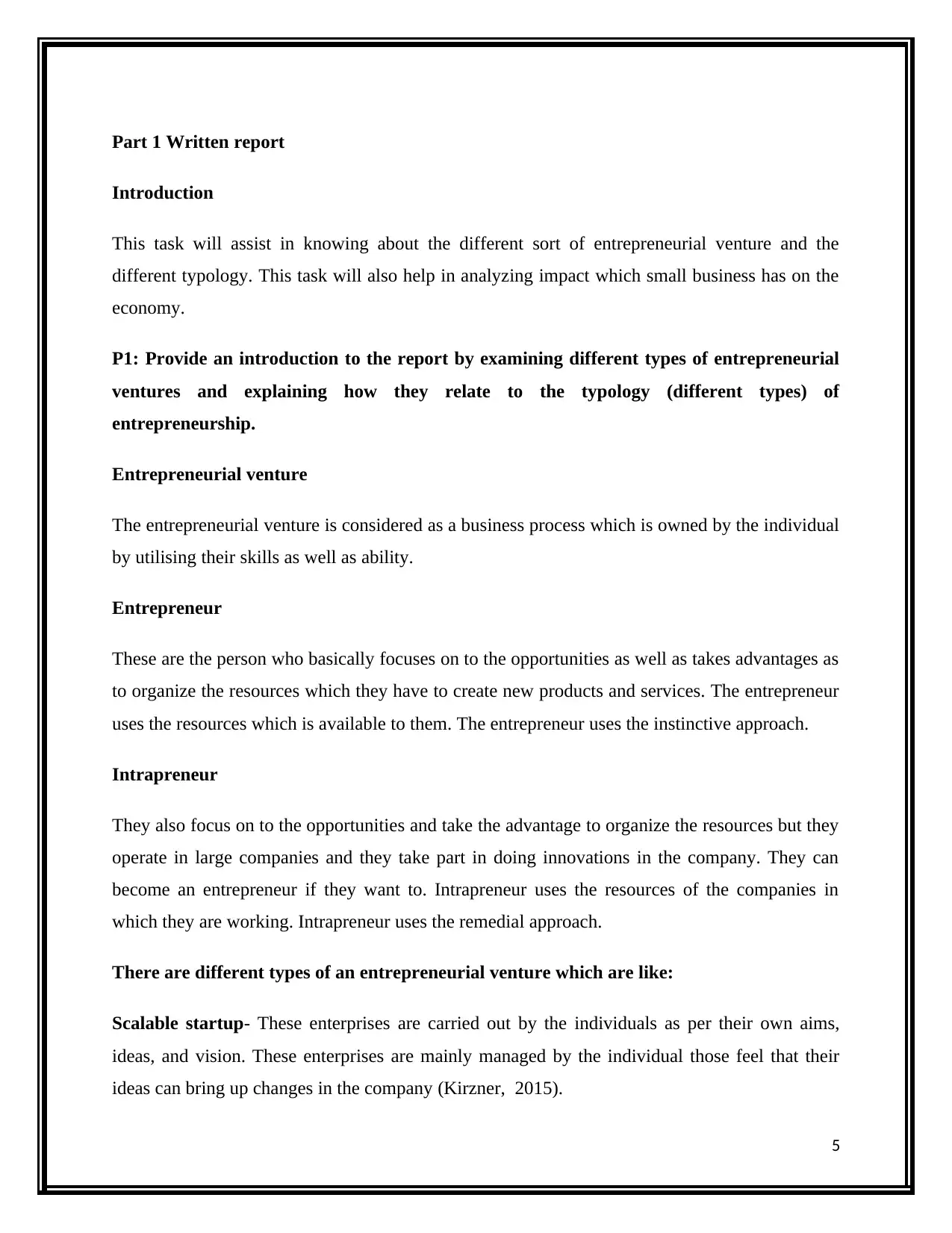
Part 1 Written report
Introduction
This task will assist in knowing about the different sort of entrepreneurial venture and the
different typology. This task will also help in analyzing impact which small business has on the
economy.
P1: Provide an introduction to the report by examining different types of entrepreneurial
ventures and explaining how they relate to the typology (different types) of
entrepreneurship.
Entrepreneurial venture
The entrepreneurial venture is considered as a business process which is owned by the individual
by utilising their skills as well as ability.
Entrepreneur
These are the person who basically focuses on to the opportunities as well as takes advantages as
to organize the resources which they have to create new products and services. The entrepreneur
uses the resources which is available to them. The entrepreneur uses the instinctive approach.
Intrapreneur
They also focus on to the opportunities and take the advantage to organize the resources but they
operate in large companies and they take part in doing innovations in the company. They can
become an entrepreneur if they want to. Intrapreneur uses the resources of the companies in
which they are working. Intrapreneur uses the remedial approach.
There are different types of an entrepreneurial venture which are like:
Scalable startup- These enterprises are carried out by the individuals as per their own aims,
ideas, and vision. These enterprises are mainly managed by the individual those feel that their
ideas can bring up changes in the company (Kirzner, 2015).
5
Introduction
This task will assist in knowing about the different sort of entrepreneurial venture and the
different typology. This task will also help in analyzing impact which small business has on the
economy.
P1: Provide an introduction to the report by examining different types of entrepreneurial
ventures and explaining how they relate to the typology (different types) of
entrepreneurship.
Entrepreneurial venture
The entrepreneurial venture is considered as a business process which is owned by the individual
by utilising their skills as well as ability.
Entrepreneur
These are the person who basically focuses on to the opportunities as well as takes advantages as
to organize the resources which they have to create new products and services. The entrepreneur
uses the resources which is available to them. The entrepreneur uses the instinctive approach.
Intrapreneur
They also focus on to the opportunities and take the advantage to organize the resources but they
operate in large companies and they take part in doing innovations in the company. They can
become an entrepreneur if they want to. Intrapreneur uses the resources of the companies in
which they are working. Intrapreneur uses the remedial approach.
There are different types of an entrepreneurial venture which are like:
Scalable startup- These enterprises are carried out by the individuals as per their own aims,
ideas, and vision. These enterprises are mainly managed by the individual those feel that their
ideas can bring up changes in the company (Kirzner, 2015).
5
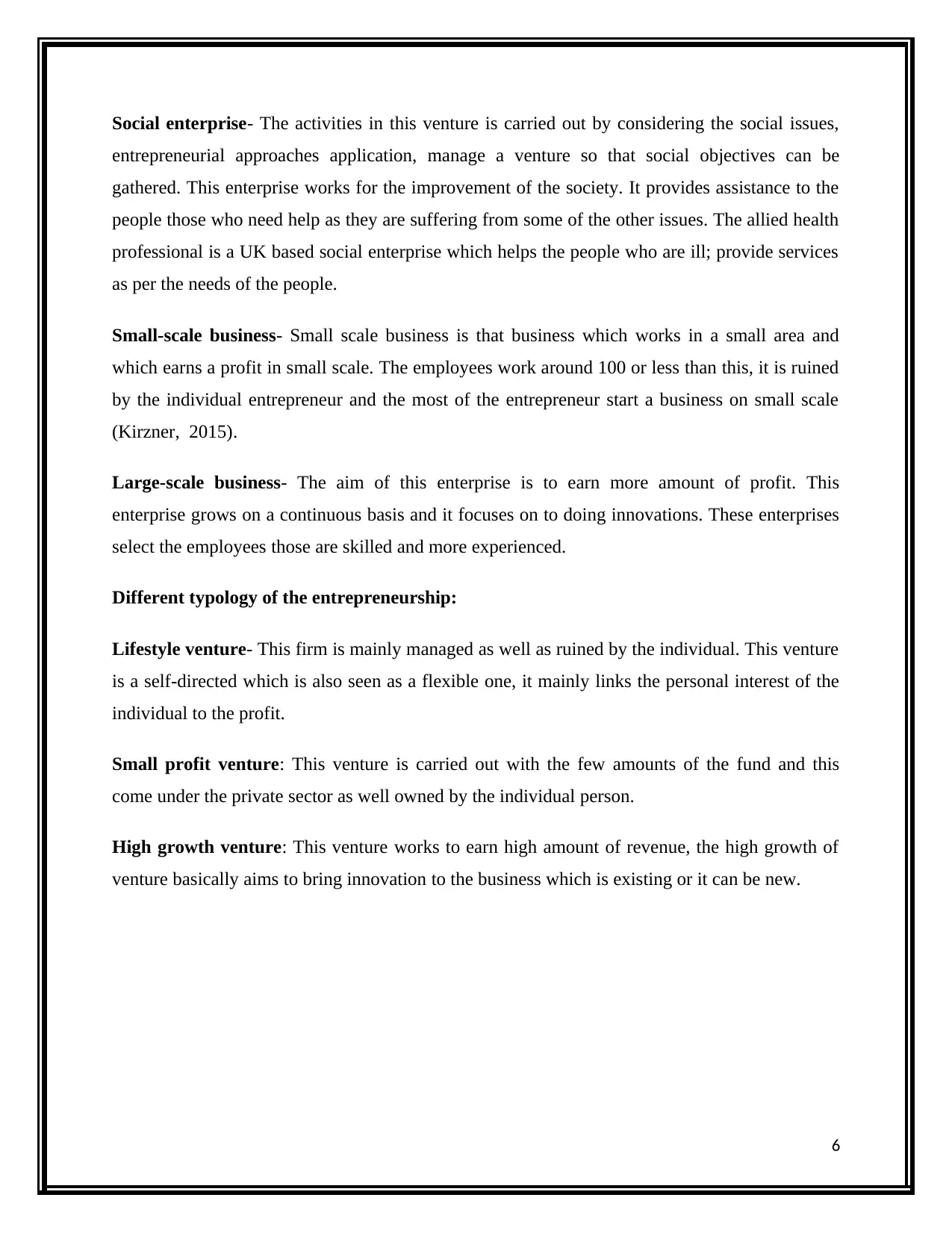
Social enterprise- The activities in this venture is carried out by considering the social issues,
entrepreneurial approaches application, manage a venture so that social objectives can be
gathered. This enterprise works for the improvement of the society. It provides assistance to the
people those who need help as they are suffering from some of the other issues. The allied health
professional is a UK based social enterprise which helps the people who are ill; provide services
as per the needs of the people.
Small-scale business- Small scale business is that business which works in a small area and
which earns a profit in small scale. The employees work around 100 or less than this, it is ruined
by the individual entrepreneur and the most of the entrepreneur start a business on small scale
(Kirzner, 2015).
Large-scale business- The aim of this enterprise is to earn more amount of profit. This
enterprise grows on a continuous basis and it focuses on to doing innovations. These enterprises
select the employees those are skilled and more experienced.
Different typology of the entrepreneurship:
Lifestyle venture- This firm is mainly managed as well as ruined by the individual. This venture
is a self-directed which is also seen as a flexible one, it mainly links the personal interest of the
individual to the profit.
Small profit venture: This venture is carried out with the few amounts of the fund and this
come under the private sector as well owned by the individual person.
High growth venture: This venture works to earn high amount of revenue, the high growth of
venture basically aims to bring innovation to the business which is existing or it can be new.
6
entrepreneurial approaches application, manage a venture so that social objectives can be
gathered. This enterprise works for the improvement of the society. It provides assistance to the
people those who need help as they are suffering from some of the other issues. The allied health
professional is a UK based social enterprise which helps the people who are ill; provide services
as per the needs of the people.
Small-scale business- Small scale business is that business which works in a small area and
which earns a profit in small scale. The employees work around 100 or less than this, it is ruined
by the individual entrepreneur and the most of the entrepreneur start a business on small scale
(Kirzner, 2015).
Large-scale business- The aim of this enterprise is to earn more amount of profit. This
enterprise grows on a continuous basis and it focuses on to doing innovations. These enterprises
select the employees those are skilled and more experienced.
Different typology of the entrepreneurship:
Lifestyle venture- This firm is mainly managed as well as ruined by the individual. This venture
is a self-directed which is also seen as a flexible one, it mainly links the personal interest of the
individual to the profit.
Small profit venture: This venture is carried out with the few amounts of the fund and this
come under the private sector as well owned by the individual person.
High growth venture: This venture works to earn high amount of revenue, the high growth of
venture basically aims to bring innovation to the business which is existing or it can be new.
6
⊘ This is a preview!⊘
Do you want full access?
Subscribe today to unlock all pages.

Trusted by 1+ million students worldwide
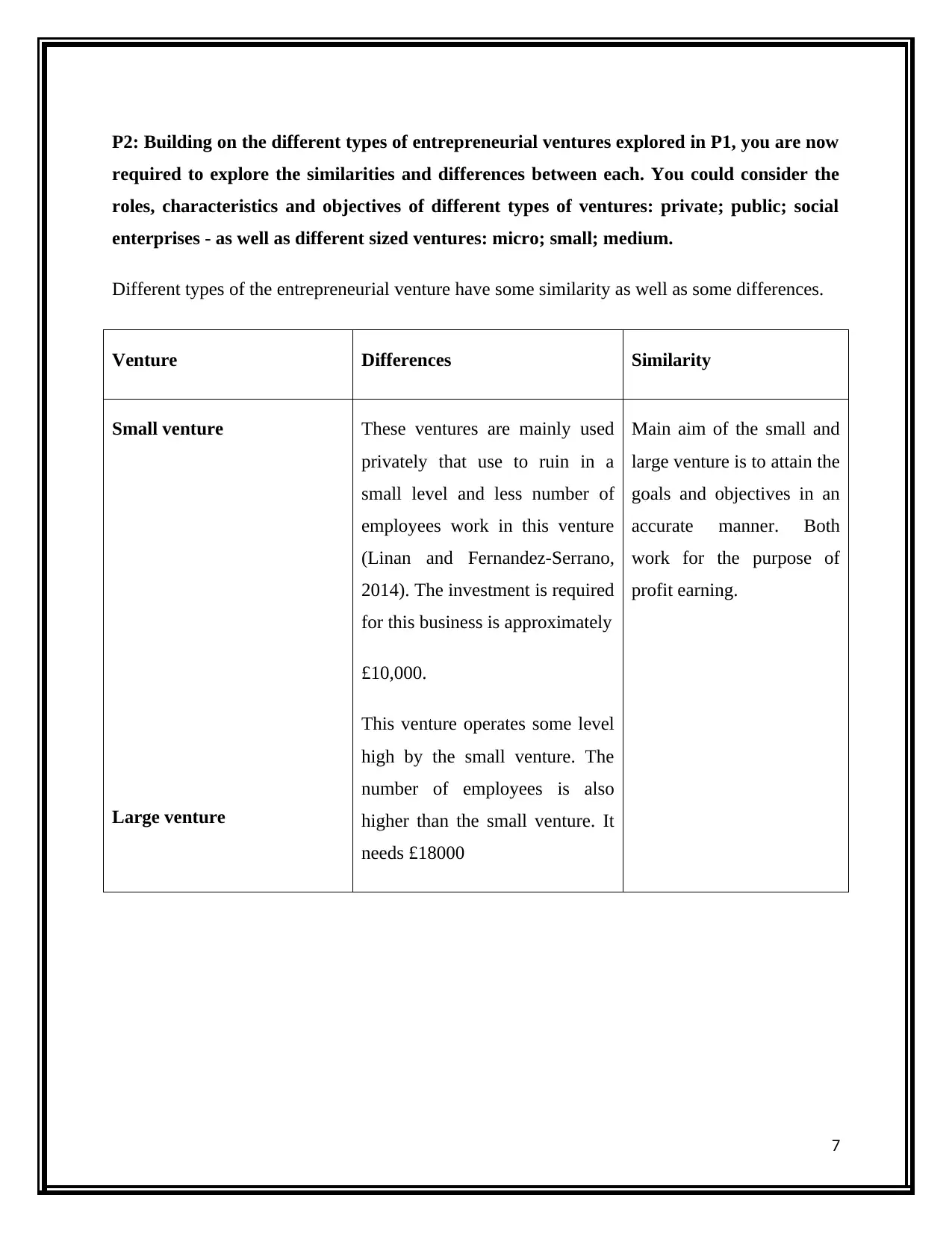
P2: Building on the different types of entrepreneurial ventures explored in P1, you are now
required to explore the similarities and differences between each. You could consider the
roles, characteristics and objectives of different types of ventures: private; public; social
enterprises - as well as different sized ventures: micro; small; medium.
Different types of the entrepreneurial venture have some similarity as well as some differences.
Venture Differences Similarity
Small venture
Large venture
These ventures are mainly used
privately that use to ruin in a
small level and less number of
employees work in this venture
(Linan and Fernandez-Serrano,
2014). The investment is required
for this business is approximately
£10,000.
This venture operates some level
high by the small venture. The
number of employees is also
higher than the small venture. It
needs £18000
Main aim of the small and
large venture is to attain the
goals and objectives in an
accurate manner. Both
work for the purpose of
profit earning.
7
required to explore the similarities and differences between each. You could consider the
roles, characteristics and objectives of different types of ventures: private; public; social
enterprises - as well as different sized ventures: micro; small; medium.
Different types of the entrepreneurial venture have some similarity as well as some differences.
Venture Differences Similarity
Small venture
Large venture
These ventures are mainly used
privately that use to ruin in a
small level and less number of
employees work in this venture
(Linan and Fernandez-Serrano,
2014). The investment is required
for this business is approximately
£10,000.
This venture operates some level
high by the small venture. The
number of employees is also
higher than the small venture. It
needs £18000
Main aim of the small and
large venture is to attain the
goals and objectives in an
accurate manner. Both
work for the purpose of
profit earning.
7
Paraphrase This Document
Need a fresh take? Get an instant paraphrase of this document with our AI Paraphraser
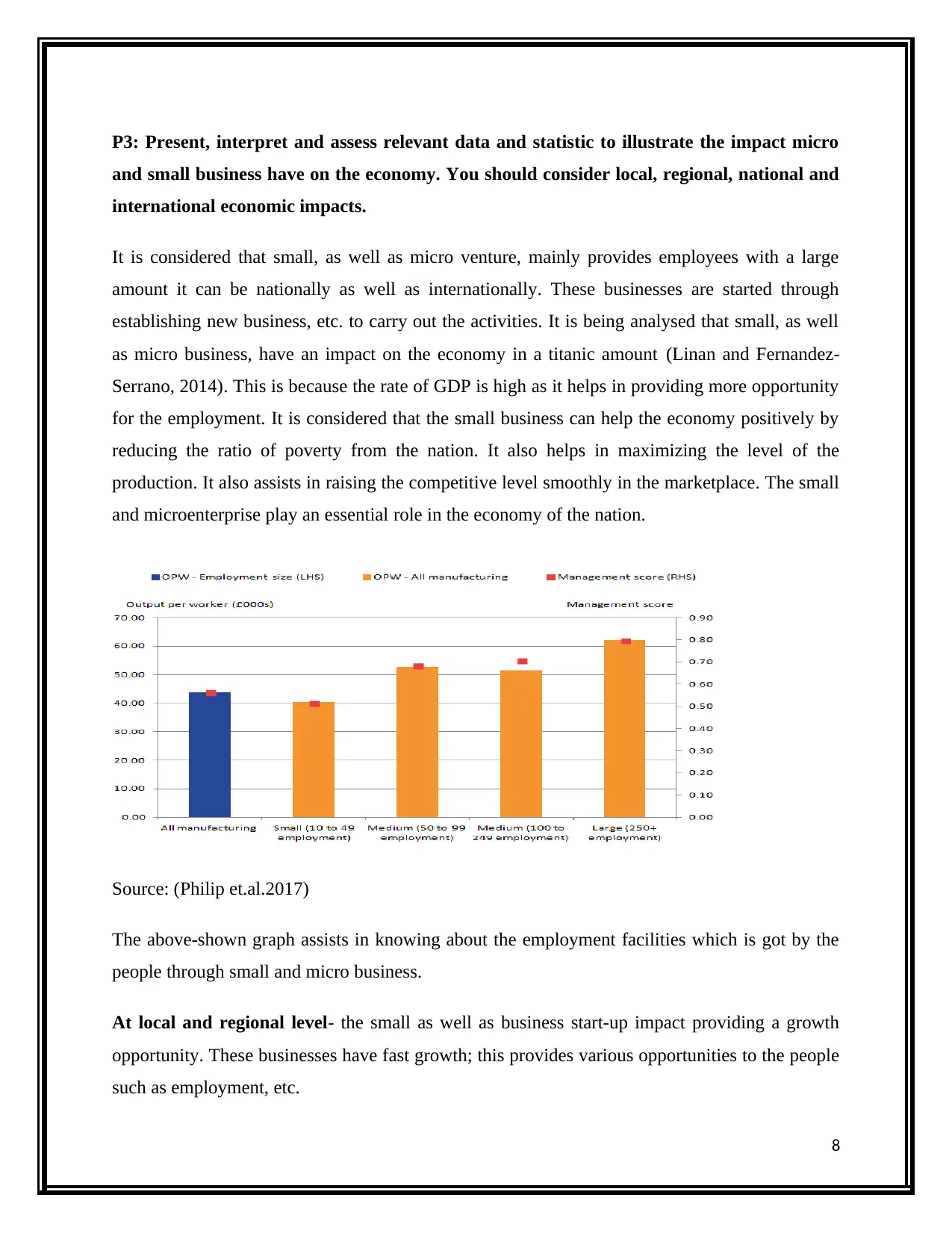
P3: Present, interpret and assess relevant data and statistic to illustrate the impact micro
and small business have on the economy. You should consider local, regional, national and
international economic impacts.
It is considered that small, as well as micro venture, mainly provides employees with a large
amount it can be nationally as well as internationally. These businesses are started through
establishing new business, etc. to carry out the activities. It is being analysed that small, as well
as micro business, have an impact on the economy in a titanic amount (Linan and Fernandez-
Serrano, 2014). This is because the rate of GDP is high as it helps in providing more opportunity
for the employment. It is considered that the small business can help the economy positively by
reducing the ratio of poverty from the nation. It also helps in maximizing the level of the
production. It also assists in raising the competitive level smoothly in the marketplace. The small
and microenterprise play an essential role in the economy of the nation.
Source: (Philip et.al.2017)
The above-shown graph assists in knowing about the employment facilities which is got by the
people through small and micro business.
At local and regional level- the small as well as business start-up impact providing a growth
opportunity. These businesses have fast growth; this provides various opportunities to the people
such as employment, etc.
8
and small business have on the economy. You should consider local, regional, national and
international economic impacts.
It is considered that small, as well as micro venture, mainly provides employees with a large
amount it can be nationally as well as internationally. These businesses are started through
establishing new business, etc. to carry out the activities. It is being analysed that small, as well
as micro business, have an impact on the economy in a titanic amount (Linan and Fernandez-
Serrano, 2014). This is because the rate of GDP is high as it helps in providing more opportunity
for the employment. It is considered that the small business can help the economy positively by
reducing the ratio of poverty from the nation. It also helps in maximizing the level of the
production. It also assists in raising the competitive level smoothly in the marketplace. The small
and microenterprise play an essential role in the economy of the nation.
Source: (Philip et.al.2017)
The above-shown graph assists in knowing about the employment facilities which is got by the
people through small and micro business.
At local and regional level- the small as well as business start-up impact providing a growth
opportunity. These businesses have fast growth; this provides various opportunities to the people
such as employment, etc.
8

At the national as well as international level- both the companies impact by providing proper
turnover so which have a huge impact on the economy. Turnover is considered as an essential
part as it deals in measuring of the GDP. These businesses have a turnover of around £ 621000
above (Linan and Fernandez-Serrano, 2014).
Size- size of these businesses is not that much huge, it is small in size and all of its operations are
carried in a small level.
Profit- It does not achieve high-profit compared to the medium or large business.
9
turnover so which have a huge impact on the economy. Turnover is considered as an essential
part as it deals in measuring of the GDP. These businesses have a turnover of around £ 621000
above (Linan and Fernandez-Serrano, 2014).
Size- size of these businesses is not that much huge, it is small in size and all of its operations are
carried in a small level.
Profit- It does not achieve high-profit compared to the medium or large business.
9
⊘ This is a preview!⊘
Do you want full access?
Subscribe today to unlock all pages.

Trusted by 1+ million students worldwide
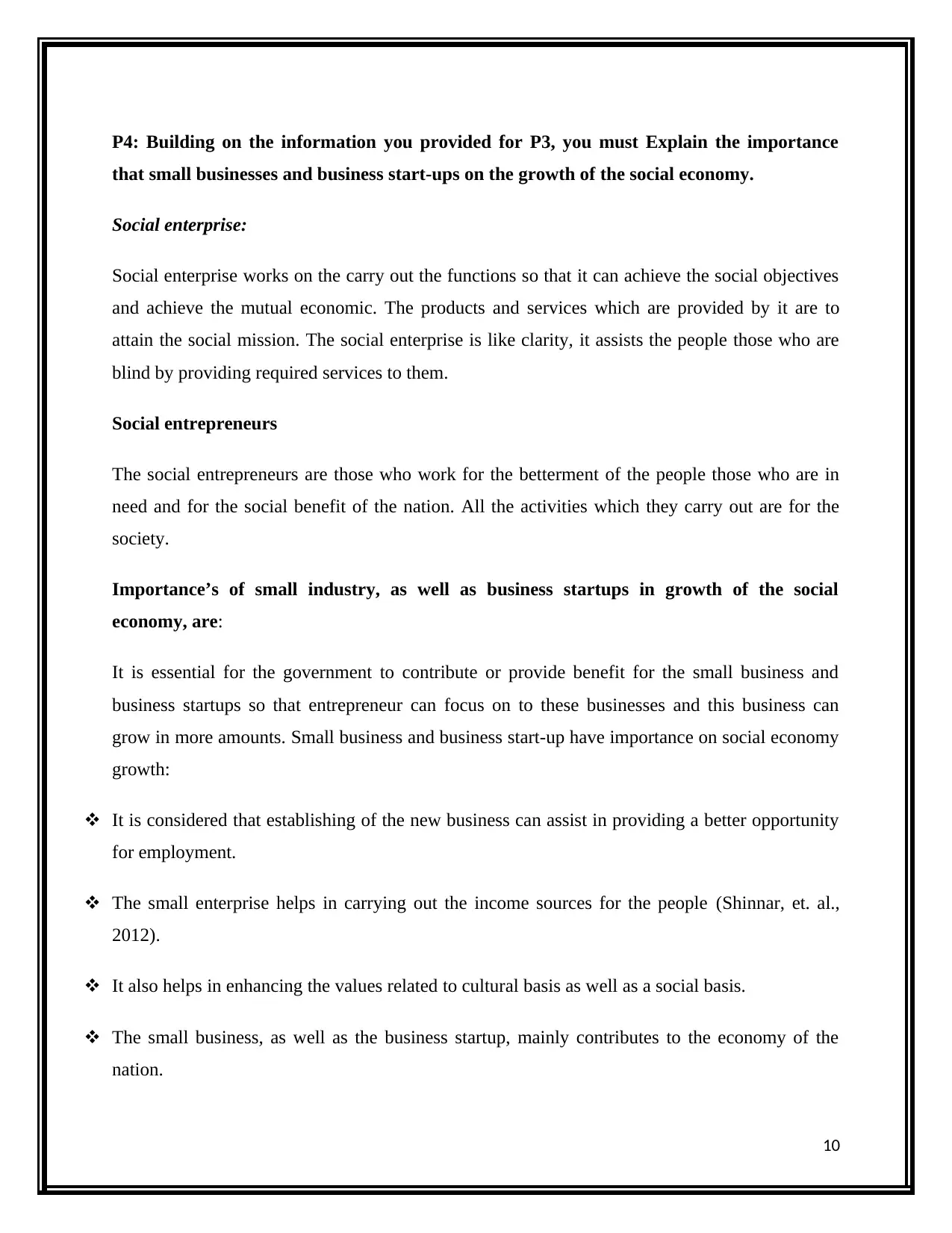
P4: Building on the information you provided for P3, you must Explain the importance
that small businesses and business start-ups on the growth of the social economy.
Social enterprise:
Social enterprise works on the carry out the functions so that it can achieve the social objectives
and achieve the mutual economic. The products and services which are provided by it are to
attain the social mission. The social enterprise is like clarity, it assists the people those who are
blind by providing required services to them.
Social entrepreneurs
The social entrepreneurs are those who work for the betterment of the people those who are in
need and for the social benefit of the nation. All the activities which they carry out are for the
society.
Importance’s of small industry, as well as business startups in growth of the social
economy, are:
It is essential for the government to contribute or provide benefit for the small business and
business startups so that entrepreneur can focus on to these businesses and this business can
grow in more amounts. Small business and business start-up have importance on social economy
growth:
It is considered that establishing of the new business can assist in providing a better opportunity
for employment.
The small enterprise helps in carrying out the income sources for the people (Shinnar, et. al.,
2012).
It also helps in enhancing the values related to cultural basis as well as a social basis.
The small business, as well as the business startup, mainly contributes to the economy of the
nation.
10
that small businesses and business start-ups on the growth of the social economy.
Social enterprise:
Social enterprise works on the carry out the functions so that it can achieve the social objectives
and achieve the mutual economic. The products and services which are provided by it are to
attain the social mission. The social enterprise is like clarity, it assists the people those who are
blind by providing required services to them.
Social entrepreneurs
The social entrepreneurs are those who work for the betterment of the people those who are in
need and for the social benefit of the nation. All the activities which they carry out are for the
society.
Importance’s of small industry, as well as business startups in growth of the social
economy, are:
It is essential for the government to contribute or provide benefit for the small business and
business startups so that entrepreneur can focus on to these businesses and this business can
grow in more amounts. Small business and business start-up have importance on social economy
growth:
It is considered that establishing of the new business can assist in providing a better opportunity
for employment.
The small enterprise helps in carrying out the income sources for the people (Shinnar, et. al.,
2012).
It also helps in enhancing the values related to cultural basis as well as a social basis.
The small business, as well as the business startup, mainly contributes to the economy of the
nation.
10
Paraphrase This Document
Need a fresh take? Get an instant paraphrase of this document with our AI Paraphraser

It assists in reducing the employment rate.
Both of this business also assists in minimising the gaps which come in between the rich as well
as poor as per the financial basis.
These businesses also help in increasing the standards of the living of the people.
It is very much helpful for the local people, as it helps in providing employment to them.
11
Both of this business also assists in minimising the gaps which come in between the rich as well
as poor as per the financial basis.
These businesses also help in increasing the standards of the living of the people.
It is very much helpful for the local people, as it helps in providing employment to them.
11
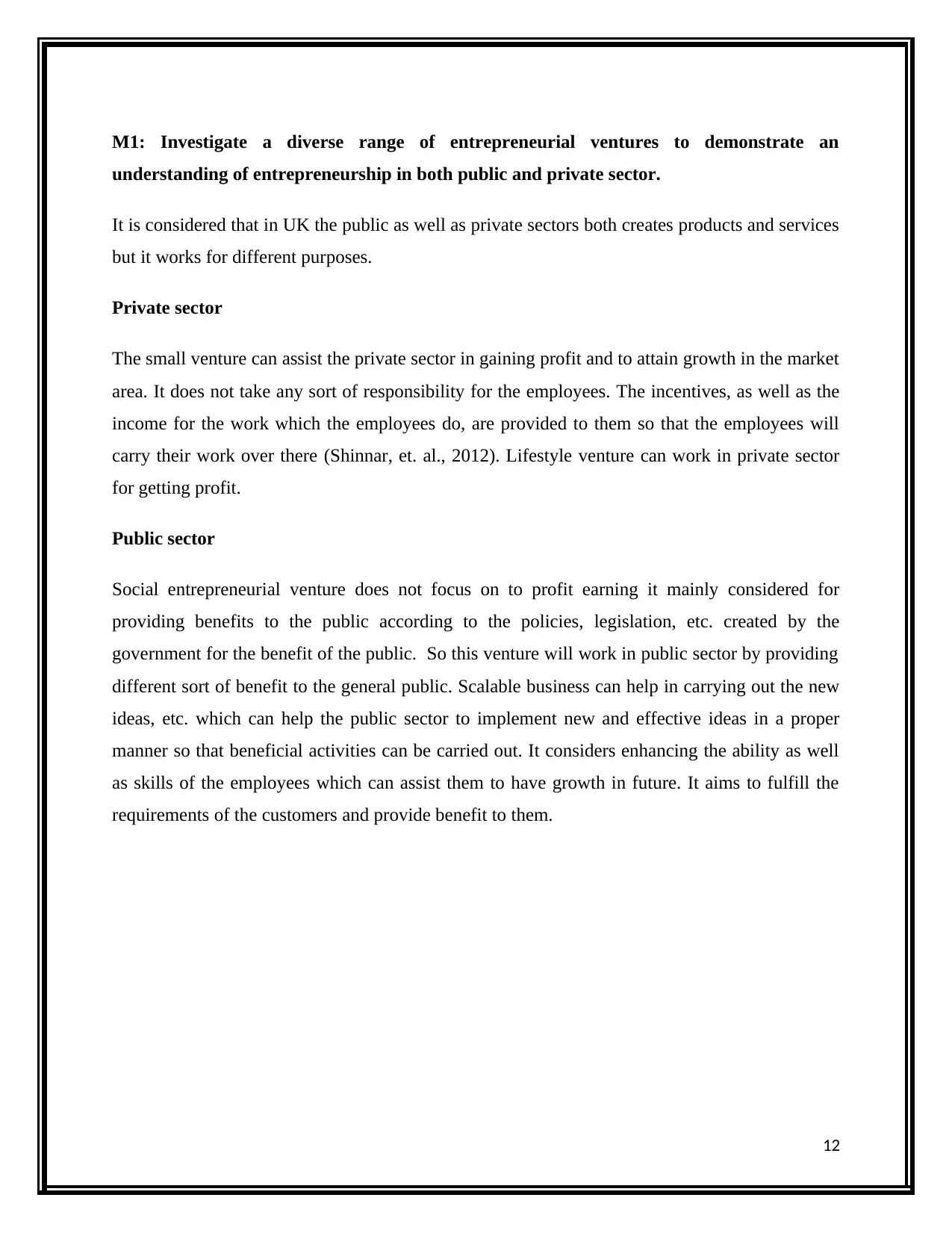
M1: Investigate a diverse range of entrepreneurial ventures to demonstrate an
understanding of entrepreneurship in both public and private sector.
It is considered that in UK the public as well as private sectors both creates products and services
but it works for different purposes.
Private sector
The small venture can assist the private sector in gaining profit and to attain growth in the market
area. It does not take any sort of responsibility for the employees. The incentives, as well as the
income for the work which the employees do, are provided to them so that the employees will
carry their work over there (Shinnar, et. al., 2012). Lifestyle venture can work in private sector
for getting profit.
Public sector
Social entrepreneurial venture does not focus on to profit earning it mainly considered for
providing benefits to the public according to the policies, legislation, etc. created by the
government for the benefit of the public. So this venture will work in public sector by providing
different sort of benefit to the general public. Scalable business can help in carrying out the new
ideas, etc. which can help the public sector to implement new and effective ideas in a proper
manner so that beneficial activities can be carried out. It considers enhancing the ability as well
as skills of the employees which can assist them to have growth in future. It aims to fulfill the
requirements of the customers and provide benefit to them.
12
understanding of entrepreneurship in both public and private sector.
It is considered that in UK the public as well as private sectors both creates products and services
but it works for different purposes.
Private sector
The small venture can assist the private sector in gaining profit and to attain growth in the market
area. It does not take any sort of responsibility for the employees. The incentives, as well as the
income for the work which the employees do, are provided to them so that the employees will
carry their work over there (Shinnar, et. al., 2012). Lifestyle venture can work in private sector
for getting profit.
Public sector
Social entrepreneurial venture does not focus on to profit earning it mainly considered for
providing benefits to the public according to the policies, legislation, etc. created by the
government for the benefit of the public. So this venture will work in public sector by providing
different sort of benefit to the general public. Scalable business can help in carrying out the new
ideas, etc. which can help the public sector to implement new and effective ideas in a proper
manner so that beneficial activities can be carried out. It considers enhancing the ability as well
as skills of the employees which can assist them to have growth in future. It aims to fulfill the
requirements of the customers and provide benefit to them.
12
⊘ This is a preview!⊘
Do you want full access?
Subscribe today to unlock all pages.

Trusted by 1+ million students worldwide
1 out of 27
Related Documents
Your All-in-One AI-Powered Toolkit for Academic Success.
+13062052269
info@desklib.com
Available 24*7 on WhatsApp / Email
![[object Object]](/_next/static/media/star-bottom.7253800d.svg)
Unlock your academic potential
Copyright © 2020–2026 A2Z Services. All Rights Reserved. Developed and managed by ZUCOL.




